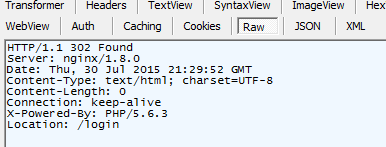

- #How to bypass redirection webscraper php registration#
- #How to bypass redirection webscraper php code#
- #How to bypass redirection webscraper php trial#
- #How to bypass redirection webscraper php password#
This is because this configuration file was coded in the earliest days of the web (HTTP), for one of the first Web Servers ever! Eventually these Web Servers (configured with htaccess) became known as the World Wide Web, and eventually grew into the Internet we use today.
#How to bypass redirection webscraper php password#
htaccess has the ability to control access/settings for the HyperText Transfer Protocol ( HTTP) using Password Protection, 301 Redirects, rewrites, and much much more. That being said, and to address the moral of this story: if a site does show even the slightest reluctancy to being scraped, don't scrape it.Htaccess is a very ancient configuration file that controls the Web Server running your website, and is one of the most powerful configuration files you will ever come across.
#How to bypass redirection webscraper php code#
There is no silver bullet, as every site can have custom code or different detection settings in the libraries they use.
#How to bypass redirection webscraper php trial#
It's usually a matter of trial and error. If you can think of it, the developer of the site (or library) has also thought of it. Five requests in one second is suspicious, but so is one request exactly every five seconds.Īll of this is rather trivial. No pingback, no mouse events: you're a bot. Some sites use a pingback script, some use input detection. If one of the resources (either embedded in the HTML or linked from another file) is a script, you may need to execute the script. If the main document links to more resources in the received document (again, if HTML), then fetch those resources as well. If the response sets cookies, store those and use them in successive requests. That is properly populate the request headers like a browser would, read the entire response and act on it (if it contains HTML). This means first and foremost, your user agent must act like a browser. You have to remember that the ones building the site do not want their content scraped, so anything that makes you look like a bot can be determined and used against you. I still can't find a canonical "How to write a web scraper" Q&A, here goes: let your code act like a human. Very extended non-viable wait intervals around 10 minutes, from request to request, solves the problem.ĭoing 29 consecutive requests then waiting 10 minutes to do the 30th request does not solves the problem. Random wait intervals to do next requests, between 3 to 10 seconds. Usage of x-forwared-for header with random ipv4 and proxy. Request: GET /rd/TdcfliKN0j9dT-bIMpo-GynUNR63kfnDsJn_YOP8uurTmlvy7C3oKnJtb1Mi-CI_fGsHJ72O49dM1IzXDCPNuPf3OfEb21w5hkGdV8ny_2u2pKo6yBgMbPCdAF-ti1uomfp3mWcB_K9M8PitpDMkg./x-Mad-VYWQz_lpphY5LN_fnkid_zqmI-i5AYJgziAl93kYhdvtlwVijRDmSGIifl-ouZki2eTWit7zi38raKiYkKtPqKSWftIfwFqIHD0bXua4z_LcrHQOnKwCWSNp0kJKcowVQSza8XJ88-TWJfA.



This is what I've captured from http headers: The only condition is: No proxy/VPN usage. I would like to know what methodology I should implement to avoid that recaptcha and still redirecting urls without problems. With the current site I'm scraping though, when I'm consecutively requesting 30 of their URLs, the server identifies my connection as "unusual traffic" and a Google's recaptcha appears: I normally develop web-scrapers for private usage (I mean with no economical expectations) and for one reason: it saves me a lot of time each day.
#How to bypass redirection webscraper php registration#
For ethical reasons I would like to remark that the content of the website mentioned here is completelly offered for free, not registration needed and I'm not breaking any rule of they neither any law.


 0 kommentar(er)
0 kommentar(er)
